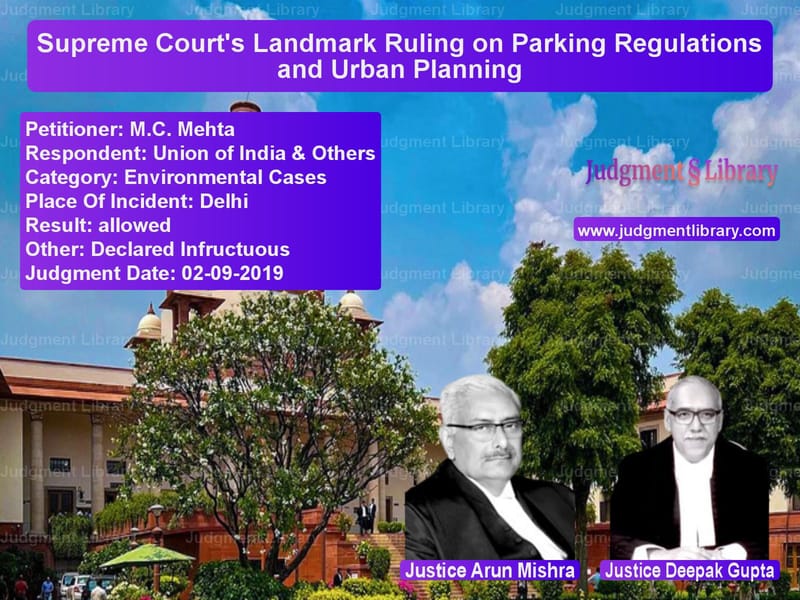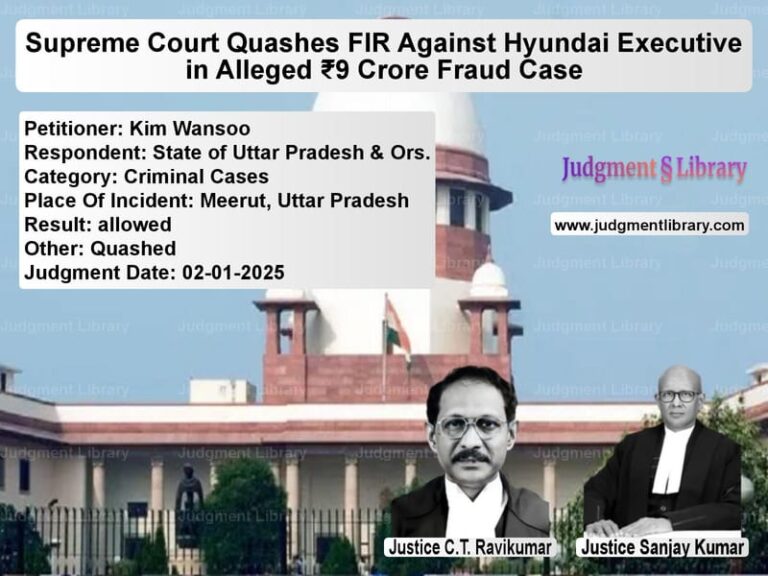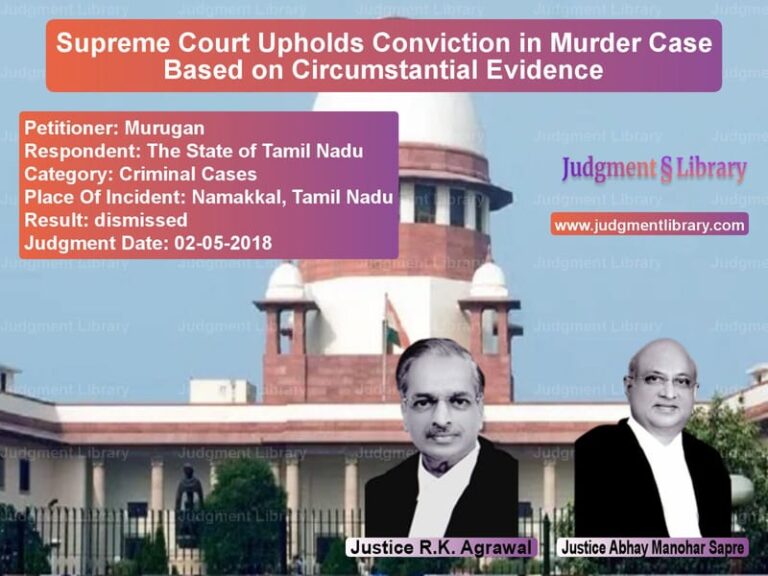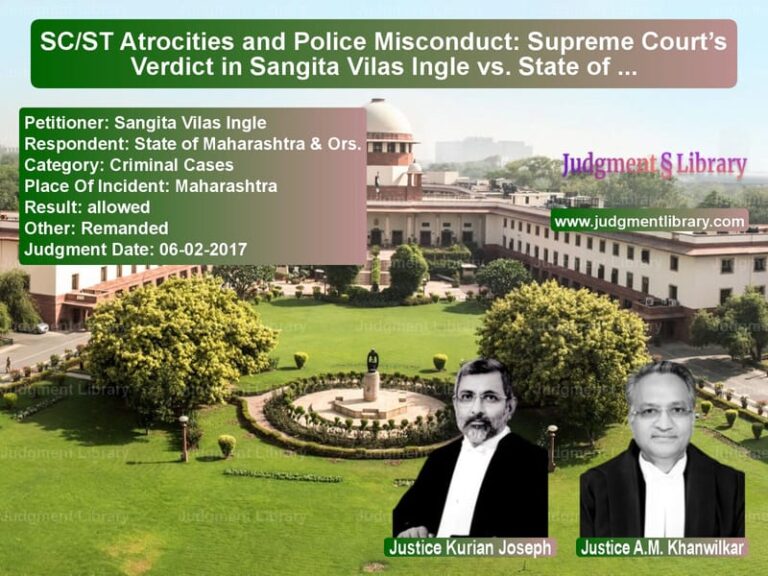Supreme Court’s Landmark Ruling on Parking Regulations and Urban Planning
The case of M.C. Mehta v. Union of India & Others brings forth a crucial legal discussion on urban development, parking management, and the responsibility of municipal bodies in ensuring proper parking infrastructure. The Supreme Court of India, while delivering its judgment, focused on the urgent need to regulate parking spaces in residential areas, commercial zones, and transport hubs.
Background of the Case
The case was initiated as a public interest litigation (PIL) by environmental activist M.C. Mehta, highlighting the increasing urban congestion caused by unregulated parking and poor planning of transportation hubs. The Court examined the parking crisis in Delhi and other metropolitan cities and directed government agencies to frame and implement proper parking policies.
The key issues addressed in the case were:
- The lack of proper parking space in residential areas, leading to disputes among neighbors.
- The failure of urban planning authorities to allocate adequate parking areas in new constructions.
- The burden of private vehicles on public infrastructure and the need for alternative transportation solutions.
- The responsibility of municipal authorities in maintaining clear pavements and roads.
Petitioner’s (M.C. Mehta’s) Arguments
M.C. Mehta contended that:
- The government’s failure to enforce proper parking laws led to traffic congestion and environmental pollution.
- The municipal corporations allowed excessive building construction without considering the impact on parking needs.
- Pavements and roads meant for pedestrians were encroached upon by parked vehicles.
- The authorities must be directed to frame and enforce strict parking policies across urban and semi-urban areas.
Respondents’ (Union of India & Others) Arguments
The government and municipal authorities responded by stating that:
- Several initiatives, including multi-level parking and electronic ticketing systems, were being planned to ease congestion.
- New parking policies were being drafted to ensure better urban mobility.
- Removing vehicles from pavements required public awareness and enforcement mechanisms.
- Space constraints in older urban areas made it difficult to create new parking spots.
Supreme Court’s Observations and Judgment
The Supreme Court analyzed the growing urbanization trends and the lack of regulatory frameworks governing parking. The Court observed:
“The increasing number of personal vehicles is monopolizing public infrastructure. A comprehensive policy is required to balance individual convenience with societal needs.”
It further noted:
“Pavements are meant for pedestrians. Encroachments, whether by shopkeepers or parked vehicles, must be removed to ensure smooth mobility.”
Based on its findings, the Supreme Court issued several key directives:
- Municipal corporations must ensure all pavements are cleared of encroachments within 15 days.
- A long-term parking policy must be formulated with a minimum assessment period of 25 years.
- Authorities must prioritize mass transportation solutions over personal vehicle expansion.
- Commercial areas, hospitals, and government institutions must have designated parking spaces to prevent road congestion.
- Delhi’s municipal bodies were directed to implement an RFID-based vehicle tracking system to monitor parking violations.
Key Takeaways from the Judgment
- Enforcement of Parking Regulations: The ruling mandates municipal bodies to enforce strict parking rules and remove illegal encroachments.
- Urban Planning and Sustainable Development: The Court emphasized the importance of planned parking spaces in urban projects.
- Alternative Transport Solutions: The decision encourages the use of mass public transport systems to reduce reliance on private vehicles.
- Improved Public Spaces: The judgment prioritizes pedestrian rights by ensuring pavements are free from obstructions.
Impact of the Judgment
- Stronger Enforcement of Parking Policies: The ruling gives local authorities the legal backing to regulate and enforce parking policies effectively.
- Guidance for Future Urban Planning: This decision serves as a benchmark for future urban infrastructure projects, ensuring parking is a primary consideration.
- Better Traffic Management: By reducing random parking on roads, the judgment helps streamline urban traffic movement.
Conclusion
The Supreme Court’s ruling in M.C. Mehta v. Union of India is a landmark judgment in urban planning and environmental law. By directing the enforcement of proper parking policies, the Court has taken a significant step toward reducing congestion, improving public mobility, and ensuring sustainable urban growth. The judgment sets a strong precedent for municipal bodies to proactively regulate parking infrastructure in Indian cities.
Petitioner Name: M.C. Mehta.Respondent Name: Union of India & Others.Judgment By: Justice Arun Mishra, Justice Deepak Gupta.Place Of Incident: Delhi.Judgment Date: 02-09-2019.
Don’t miss out on the full details! Download the complete judgment in PDF format below and gain valuable insights instantly!
Download Judgment: M.C. Mehta vs Union of India & Oth Supreme Court of India Judgment Dated 02-09-2019.pdf
Direct Downlaod Judgment: Direct downlaod this Judgment
See all petitions in Environmental Cases
See all petitions in Public Interest Litigation
See all petitions in Other Cases
See all petitions in Judgment by Arun Mishra
See all petitions in Judgment by Deepak Gupta
See all petitions in allowed
See all petitions in Declared Infructuous
See all petitions in supreme court of India judgments September 2019
See all petitions in 2019 judgments
See all posts in Environmental Cases Category
See all allowed petitions in Environmental Cases Category
See all Dismissed petitions in Environmental Cases Category
See all partially allowed petitions in Environmental Cases Category







